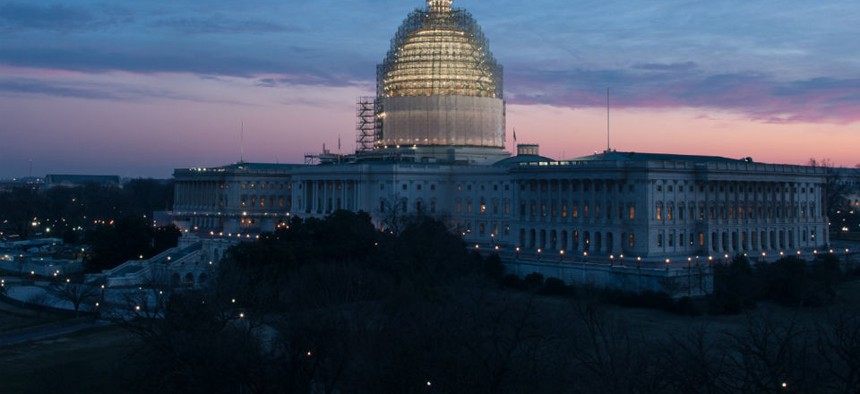
Architect of the Capitol
House Approves Budget That Cuts Agency Spending and Employee Compensation
Senate still working on its own budget resolution.
The House on Wednesday evening approved 228-199 a budget resolution that would drastically reduce spending at non-Defense federal agencies and cut compensation for federal workers and retirees.
The budget would increase federal employees’ contributions to their pensions, effectively resulting in a pay cut of between 2 percent and 5 percent. The plan suggests eventually phasing out the defined benefit program entirely in favor of just a defined contribution system. The changes would save $127 billion over 10 years, the House Budget Committee said in a report on the resolution, as part of the $5.5 trillion in overall savings and cuts laid out in the blueprint.
The plan would cut non-Defense funding by $759 billion below sequestration caps by 2025. The report said specifically that agencies are expected to meet discretionary spending cuts in part through attrition measures resulting in a 10 percent reduction in the overall size of the federal workforce. Under the plan, agencies would only fill one out of every three vacancies created by employees leaving federal service. The Internal Revenue Service -- which has slashed 13,000 positions since 2010 -- would be at particular risk for job cuts, as the budget’s architects said a simplified tax code would result in a diminished IRS footprint.
The budget would phase out the Federal Employees Retirement System annuity supplement, designed to boost the annuity of young retirees. It also outlined a plan to limit the rate of return on the Thrift Savings Plan’s government securities (G) fund, noting it could save $32 billion over 10 years.
The budget framework would also make changes to the Federal Employees Health Benefits Program, including tying the government’s share of premiums for retirees to inflation rather than the average cost of plans. It would additionally tie retirees’ health benefits to length of service. The initiatives would save $21.7 billion and $1.2 billion, respectively, according to committee estimates. Postal employees would also have to contribute more toward their health and life insurance premiums under the House-backed plan.
Federal employee groups were quick to blast the vote, calling it “unconscionable” that lawmakers would once again target federal workers and retirees.
“Today’s House passage of this grossly unfair budget sends a powerful message to federal employees: ‘The work you do to protect our nation and its citizens is not valued,’ ” said Richard Thissen, president of the National Active and Retired Federal Employees Association. “The House is sending an equally powerful message to young college graduates considering entering federal service: ‘We believe the federal government should be an employer of last resort.’ ”
Earlier on Wednesday, the House rejected a more conservative budget resolution, which aimed to balance the budget in five years rather than 10 by cutting a total of $7.1 trillion. Conservative Republicans also wanted to bring more Defense spending on budget, rejecting a tactical move included in the resolution adopted by the House to increase funding to the emergency Overseas Contingency Operations account.
The Senate is currently debating its own budget resolution, and will hold a “vote-a-rama” on amendments on Thursday. Republican leaders in the two chambers ultimately plan to reach a unified budget through a conference committee, and approve a final resolution by mid-April.
Despite outcry from the White House and congressional Democrats, a unified budget would not require President Obama’s signature. Obama has vowed to veto any spending measure -- once the appropriations process is completed -- that continues sequestration spending cuts.







